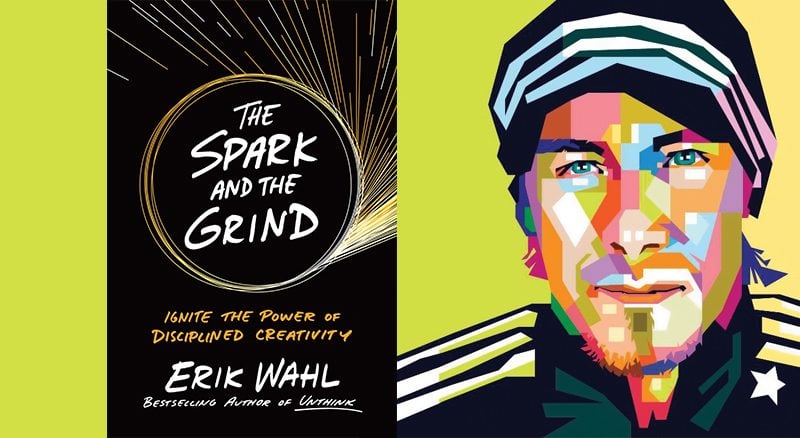The following excerpt was selected for StartupNation from “The Spark and the Grind: Ignite the Power of Disciplined Creativity” by Erik Wahl, in agreement with Portfolio, an imprint of Penguin Publishing Group, a division of Penguin Random House LLC. Copyright © Art is Freedom, LLC, 2017.
“The Spark and the Grind: Ignite the Power of Disciplined Creativity” is available today wherever fine books are sold and at StartupNation.com.
Defamiliarize the ordinary
“Genius is only a superior power of seeing.”
—John Ruskin
The goal of all great creations is to remove complexity and move toward simplicity. To do this, though, you have to enter into the complexity, the uncertainty, the unfamiliar. No two days are the same, just as no two poker hands are the same. Success in the past never guarantees success in the future. To ignite fresh sparks, you must decide to play your hand each day as uniquely as possible, removing the assumptions of historical precedent. Your brain has what you know from past experience locked in. It’s in the bank, so to speak. But the sparks that come from that reservoir are ever diminishing unless you add fresh data to it every day—unless you mix the familiar with the unfamiliar.
It is the newly stoked fires that ignite you and give your life new meaning. New begets new. Old begets old. You must go after what is new, which is never familiar at first.
A lack of creativity is fundamentally a lack of curiosity. It is a lack of desire and a latent drive to seek new answers. That drive is in you. But with it in neutral or turned off entirely, you easily cling to a binary view of the world. Things are black or white. Good or bad. Part of your tribe or alien to it.
StartupNation Originals
On the other hand, living curiously is fully embracing the moment and searching for connections in the in-between. Practice by letting this moment seize you now. Take a breath and live fully present in it. Let everything that’s happening to you happen. Don’t edit. Feel the clarity and confusion. The gain and loss. The creative journey is uncertain and may hurt you. But clinging to the same certainties will kill you. Stay open to whatever comes with the uncertainty. Breathe it in. Digest it. Fold it into your perspective and understanding. Let everything begin to teach you.
We like the way things are—especially when they’ve been that way for a long time. If it ain’t broke don’t fix it, right? There’s nothing wrong with that statement, generally speaking. When you get something right, there’s no reason not to run with it. And stick with it. No need to reinvent the wheel, as they say.
Unless . . . there’s something better.
Here’s the truth constant creators cling to: there is always something better, in this life, anyhow.
A few look for it. Most try to live without it. Eventually we all comply with the better way and enjoy the benefits. Only a few actually profit from it.
The trouble is that we are not daring people in familiar situations. When nothing is broken or worrisome or unclear, we tend not to ask questions, we dial down our curiosity. When things are fine, we leave well enough alone. We find our groove and stay in it until it’s five feet eleven inches deep. Then we realize it’s killing us.
That sums up the most common path to mediocrity.
No one would mind if breakthroughs were born out of comfort. Unfortunately, they aren’t. They are captured in the midst of uncertainty and complexity.
“Naturally,” wrote Oswald Chambers, “we are inclined to be so mathematical and calculating that we look upon uncertainty as a bad thing . . . Certainty is the mark of the common-sense life; gracious uncertainty is the mark of the spiritual life.”
Either we enter uncertainty willingly, or we wait until it comes to us. If we wait, it usually comes when we are not prepared.
The irony is that it’s far safer to enter the chaos of our own volition than to wait for it to arrive. Because chaos doesn’t knock. It doesn’t even enter through the front door. It smashes through the back window and takes us by surprise. Sometimes we don’t recover.
This is a lesson being learned in the car service industry right now. For decades, cabs and limos served the masses. One is the lowcost provider. The other the high-cost provider. Neither have changed in decades. Both were in their grooves, comfortable, albeit not immune to the fluctuations of the economy. Generally speaking, both cabs and limos had a good thing going. No need to reinvent the wheel(s), right?
Then along came the uncertainty called Uber. And its tagline: “Everyone’s private driver.”
Uber simultaneously attacked both the low-end and high-end providers in the industry by upending long-held conventions. A few innovators placed a bet that we would pay a slight premium over cab fare—or get a large discount on limo fare—for an on-call car service we could summon with our smartphones. One that was predictably excellent. One that removed the time-consuming transaction and tip from the process. One that utilized the most modern technology. One that literally put the controls in consumers’ hands and turned the process of procuring urban transportation into a convenient, viral experience.
Until a couple of years ago, I used cabs. On rare occasions, I scheduled a town car. Then a friend opened an iPhone app and touched a button while we finished espressos. Ten minutes later a shiny black Tahoe appeared at the curb in front of the San Diego café where we sat. As I watched his car drive off, I downloaded the Uber app. I’ve never gone back to the old way.
Cabs and limos are now fighting for their lives. If they survive, they won’t be the same iterations of the past several decades. In fact, as recently as the spring of 2016, yellow cabs are now promoting a new app that effectively allows riders to hail and pay for a cab through the app, much like the Uber experience.
There’s not just an entrepreneurial lesson here. Our lives are just as susceptible to the cab-and-limo mentality. Familiarity is a common sign of mediocrity. And mediocrity never made a single one of us happy or successful. Unexpected chaos in this context only makes life worse—a tangled web of confusion, disillusion, frustration, and often surrender.
Fortunately, there is an Uber in all of us. Multiple ones, actually. They’re those little itches inside—some call them thorns—that won’t go away. They nag us to keep exploring beyond what we know, what we assume, what we accept, and into that uncertain frontier called possibility. They beckon us to do it willingly, proactively. Listen to them (and me, if you don’t mind). Don’t hesitate. Don’t analyze. Just get yourself beyond what you haven’t changed for years or decades. Despite the discomfort. Regardless of the fear. That’s where your creative frontier begins.
Related: Sign up to receive the StartupNation newsletter!
“The Spark and the Grind: Ignite the Power of Disciplined Creativity” is available today wherever fine books are sold and at StartupNation.com.






